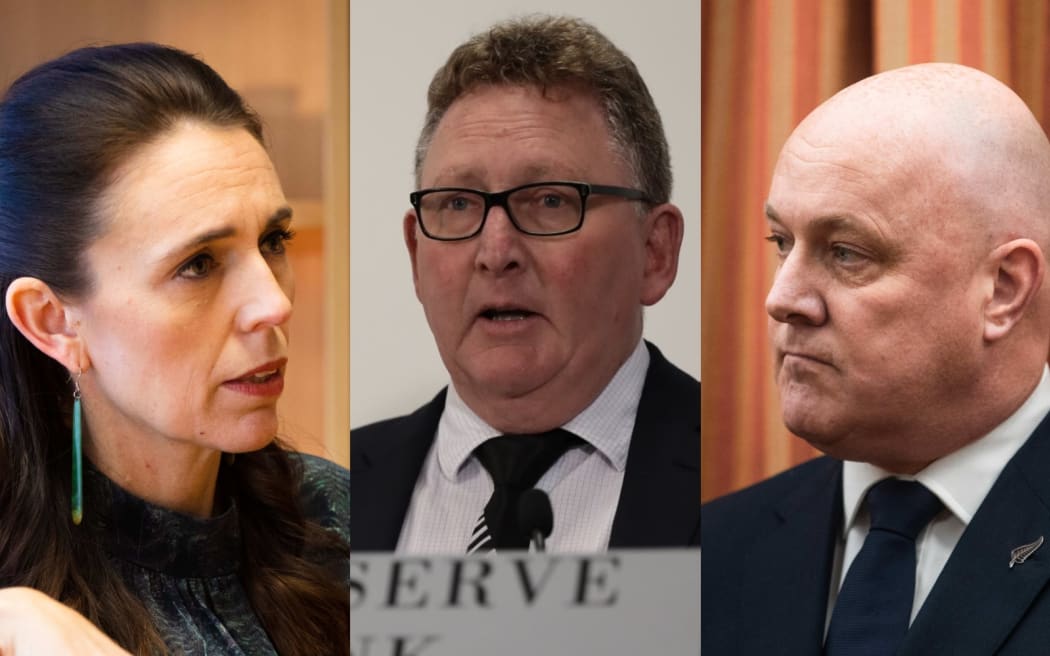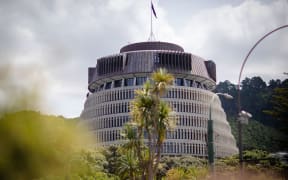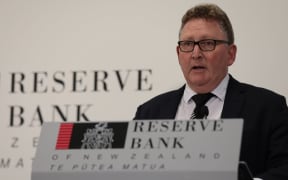
Photo: RNZ
Analysis - The prime minister casts doubt on the accuracy of a shocking poll for Labour, opposition parties are upset by Adrian Orr's re-appointment as governor of the Reserve Bank and National claims it's the underdog in the Hamilton West by-election as nominations close with 12 candidates on the ballot.
The government's week began with a poll showing Labour at its lowest ebb since Jacinda Ardern became prime minister.
The Newshub Reid Research poll had Labour on 32.3 percent, a drop of 5.9 points since the last poll in May. National had barely moved and was way ahead on 40.7 percent.
For either of the main parties being in the low 30s is really bad, going below 30 is terrible.
That's where Labour was when Andrew Little stood down and Jacindamania saved the party in the 2017 election.
The magic has evaporated since then, although Ardern is still more popular than National's leader Christopher Luxon.
Ardern played down the sharp drop in Labour's support, saying she was taking the ratings with "a grain of salt" because her party's own, much more frequent polling showed the main parties were neck and neck.
National didn't boast about it, with deputy leader Nicola Willis saying while it was a good result for her party the polls were likely to be volatile between now and the election.
ACT stood on 10 percent in the poll, which continued the trend showing National and ACT holding enough support to form a government.
The poll was released just after Labour held its annual conference in Auckland, where there was fighting talk about next year's election and Ardern's "bring it on" challenge.
The conference centrepiece was her announcement of extended eligibility for childcare support to help families with young children get through the cost of living crisis.
National called it another band-aid and said the government wasn't getting to grips with inflation.
Adrian Orr re-appointment
Finance Minister Grant Robertson this week re-appointed Adrian Orr as governor of the Reserve Bank for another five years, which upset National and ACT.
National had wanted the extension to be for one year so the next government could decide what it wanted to do with Orr, while ACT has said it has no confidence in him.
It isn't supposed to be a political issue, but it has become one since opposition parties blamed the Reserve Bank for stoking inflation by loosening monetary policy to the extent that it did during the pandemic.
National wants an independent inquiry into the economic response to the pandemic before deciding Orr's future.
The Herald's Thomas Coughlan didn't think Orr would stay on if there was a change of government.
"It means that should National and ACT win the next election, Orr will still have four years of his term to go," Coughlan said.
"In reality, he's likely to resign in those circumstances. It would be impossible for him to serve under a government that clearly has no confidence in him - even if National won't explicitly say that yet."
As for National's call for an independent inquiry, Coughlan said the government wasn't interested in that "mainly because it is afraid of what the answer might be".
Robertson fully backed Orr, saying now was the time for continuity and stability.
Later in the week the Reserve Bank released its own review of decisions taken during the pandemic, which found that easing monetary policy was warranted and avoided worst-case economic scenarios.
The Reserve Bank poured billions of dollars into the economy during the pandemic and the review also said monetary policy should have been tightened earlier in 2021, although that would not have fully offset strong inflationary pressure.
Willis, who is National's shadow finance minister, said the internal review was like asking the Reserve Bank to mark its own homework.
She called it a "back patting exercise", RNZ reported.
"Predictably, the Reserve Bank's marking of its own homework pulls its punches and fails to deliver any accountability for the mistakes in the management of New Zealand's economy," she said.
Orr dismissed the criticism, saying the review had been assessed by independent experts.
"I have no comment about the politics," he said.
"I don't feel unique - globally, central banks throughout the world are under immense attack - much of which becomes very personal very quickly."
Luxon was asked on Morning Report whether he had confidence in Orr, and replied that an independent review was needed before any decision was made.
He said he thought an extension of one year would have been "entirely appropriate, entirely fair and reasonable".
The prime minister went in for some "bank-bashing" this week, but her target was the retail banks and the huge profits they're making during the cost of living crisis.
Her comments, in response to questions at her post-cabinet press conference, were widely reported.
Ardern had a collective go at all the big banks, without naming names, saying they'd been posting huge profits for years.
"What we are seeing currently I don't think is justifiable," she said.
"We've seen this consistently, them posting significant profits. I think questions need to be asked to managers of these banks as to whether or not they are serving their communities well."
Ardern challenged the banks to look at their own policies, and reflect on whether they were doing "the right thing".
She was repeatedly asked whether the government intended doing anything about it, and she responded by saying she was making her own views known and didn't have any "policy prescription".
Stuff's political editor Luke Malpass saw her criticism as "slightly bizarre".
"She had no answer as to why bank profits were a bad thing… in fact, Ardern's comments appear to be little more than a thought bubble with the effect of the government trying to spread the blame around for continuing high inflation," he said.
"It doesn't appear there was anything particularly strategic about it or that the government appears to be ready to do anything about it."
Malpass didn't think "a bit of vague bank-bashing" would distract the public for long from what he said was the one, real-life indicator that ruled them all: inflation.
Hamilton West by-election

Hamilton West candidates Photo: RNZ
Nominations for the December 10 Hamilton West by-election closed this week with 12 candidates in the field.
One of them is going to replace Labour's Gaurav Sharma, who resigned from Parliament after being expelled from the Labour caucus following the row over his claims that he was bullied by some of his fellow MPs.
National, Labour and ACT are there along with fringe parties and a handful of independents. Sharma is contesting it under the banner of his newly-formed New Zealand Momentum Party. The Greens and NZ First are not in the field.
The reality is that either National's Tama Potaka or Labour's Georgina Dansey will win the seat.
It was held by National from 2008 until Sharma was swept in on the red tide of 2020, and its high current poll rating, plus the fact that by-elections usually favour opposition parties, should make it the favourite.
Senior National MP Chris Bishop, who is Potaka's campaign manager, insists that isn't the case.
He told the Herald he believed Dansey was the favourite. "Labour won that seat (in 2020), it's a traditionally bellweather, marginal seat so they start as favourites," he said.
National's Tim Macindoe held the seat from 2008 until 2020, increasing his majority from 1618 to 7731. Sharma won it with a majority of 6267 in 2020.
Macindoe is reported to have wanted to return, but Luxon was seeking diversity and the party selected a Māori candidate.
It's going to be an interesting contest. Labour benefits from not having the Greens in the race, so the centre-left vote won't be split. Sharma clearly has a local following but the size of it isn't known. There will be those who feel he was badly treated by Labour and should get their support.
National has ACT to contend with, and it will take some of the centre-right vote. So could the oddly-named New Conservative + One Party and the Opportunities Party (TOP, which contested the last election).
Labour doesn't have an entirely clear field, but National's is more crowded.
*Peter Wilson is a life member of Parliament's press gallery, 22 years as NZPA's political editor and seven as parliamentary bureau chief for NZ Newswire.






